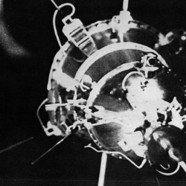Cosmos 954 downfalls – 2015
Nuclear Code of Silence
Thirty-seven years ago, the Russian nuclear powered satellite Cosmos 954 returned to Earth during its 2060th revolution. Its debris crashed on the Canadian Far North close to the Arctic. It was the 24th of January 1978, 11h53 Universal Time, 5h53 at Yellowknife on the banks of Great Slave Lake, Northwest Territories Canada.
The decade 1970-1980 is marked by the worldwide launch of nuclear-based electricity. It is the height of the Atoms for Peace campaign launched in the 1950s to erase the horrors of the atomic bombs dropped on Japan. Nuclear for all is on the way.
Polar Star n°2, 2750 polluted sites in the Arctic – 2009
 n°2
n°2
2750 polluted sites in the Arctic
The cold temperatures and permafrost have been considered by Arctic countries as a mode of confinement and an eternal repository for pollutants. But for several years, it has been known that rivers, lakes, and groundwater have been contaminated by the migration of pollutants originating from landfills and other contaminated sites. This mobilization of pollution comes from temperature fluctuations, melting snow, rain, changing levels of groundwater and flooding. The ice has not fulfilled its purpose as a cocoon in trapping pollutants. With global warming in view, the progressive rupture of the “cold chain” would be an ecological disaster and would accelerate the release of waste.
Polar Star n°1 – 2008
Polar Star n°1 (pdf 70 ko, 2 pages)
As scientists have demonstrated, aquatic and atmospheric currents tend to concentrate pollution in and above the Arctic Ocean, neighbouring countries and food web. An international policy convergence is not developing as naturally as the global climatic convergence. For this reason, France has committed to initiate an international agreement on environmental management of the Arctic, followed by a proposal from Robin des Bois*, a non-governmental organization based in France. This seminar in Monaco should be seen as the first policy oriented action with the aim of fulfilling this commitment. As every nation is responsible for problems in the Arctic, all those who contribute to the damage should play a role in the solution.
Treaty for the Arctic Ocean – 2007
The Arctic needs a treaty and a precautionary international approach. Robin des Bois presented at Grenelle de l’environment an environmental round table a proposition concerning the Arctic on the 24th of September 2007.
GRENELLE DE L’ENVIRONNEMENT
Working group No 2: Preserving biodiversity and natural resources
Detail of proposal:
Within the European framework or with other parties the MEDAD (Ministry of Ecology and Sustainable Development) should initiate a project for an Arctic Ocean treaty. This binding international conventional instrument should target identifying and quantifying the flows of atmospheric, aquatic and acoustic pollutions originating from either internal Arctic Ocean sources or external sources. It should also target the assessment of related effects on the entire Arctic ecosystem, notably on marine resources and try to limit those effects. The atmospheric contribution to the warming up of the Arctic Ocean in terms of greenhouse effect gases and possibly the aquatic contributions should be examined and mitigated. Sanitary and economic consequences of the pollutions and climatic variations and their effects on Arctic States and populations from sub-arctic regions but also migrating animal species should be included in the framework of this Arctic Ocean treaty. Particular attention should be given to risks, disturbances and pollutions associated to the exploitation of fossil resources and minerals as well as shipping and other means of transport.
The Arctic Ocean treaty should be a treaty for the protection of the natural and human environment. It should deal with managing and anticipating the consequences, in the field of chronic and acute, pollutions and in the field of climate variations and their consequences. The intention of this treaty is not to intervene in the marine territorial claims or seafloor territorial claims of Arctic States.
Arctic: a protection zone for the whales – 1996
Arctic: a protection zone for the whales (pdf 7,3 Mo, 10p.)
Dossier presented at the International Whaling Commission in Dublin in 1996
Arctic Ocean Sanctuary – 1995
Arctic Ocean Sanctuary (pdf 2.7 Mo, 18 pages)
Dossier presented at the International Whaling Commission in Dublin in 1995










